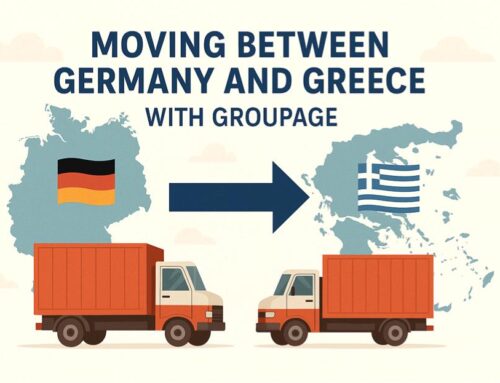A candid look into the types of customers, moving companies deal with.
Every day, in the world of moving, we meet people from all walks of life — different cultures, different temperaments, different expectations. Some customers are a dream. Others… well, let’s just say, they leave a lasting impression for all the wrong reasons.
Whether you’re moving locally or across continents, how you approach the process — and how you treat your movers — has a huge impact on how things unfold.
In this article, we shine a light on the many types of customers we deal with in the moving industry: the organized, the overwhelmed, the entitled, the vanishing acts — even the lovable ones. The aim isn’t to call anyone out (okay, maybe just a little), but to offer some insight, laughs, and self-awareness. Because the truth is: if you recognize yourself in one of these, you’re not alone — and that’s the first step toward a better moving experience for everyone.
It all starts with the first contact
Before we lift a single box or tape a single carton, we speak to customers by email, phone, or through a website inquiry. And trust us — you can tell a lot from that very first interaction. How a customer behaves in the early stages often sets the tone for the entire relationship.
Here’s what we typically see:
- The Prepared Planner sends a clear, detailed list and asks thoughtful questions. They’re polite, realistic, and responsive. They make quoting easy — and usually get priority attention because we know they’re serious.
- The Scrambler calls in a panic: “I need to move tomorrow. Can you help?!” Their inventory list is “just a few things,” which turns out to be a full three-bedroom house. They mean well, but the chaos begins before the truck even rolls out.
- The Control Freak often sends an intense email with ten bullet points and five follow-ups within the hour. They want to know exactly how each item will be packed, in what order, by whom, and at what time. Helpful? Sometimes. Overwhelming? Usually.
- The Ghost fills out the online form… then vanishes into thin air. No email replies, no returned calls. Then two weeks later: “Hey, can you still move me tomorrow?”
- The Bargain Hunter jumps straight to price. “What’s your cheapest rate?” No name, no details, no hello. They send competitor quotes like they’re playing poker. They’ll even request for extra services saying things like “Will you throw in a free piano move? What they forget? You get what you pay for — and we’d rather win customers with quality, not a race to the bottom.
- The Withholder gives as little info as possible. “It’s just some boxes,” they say, while dodging any questions about volume, access, or what “some” really means. We’re left guessing, and guessing is not a great way to run a move.
- The VIP may open with “I’m very busy, so I expect this to be handled efficiently.” They name-drop, rush the conversation, and sometimes act like we’re lucky to have their business. Not the best way to start a working relationship.
- The Cultural Ambassador is often kind and curious, but sometimes unsure about how things work. Language barriers or unfamiliar customs can create confusion — unless both sides make the effort to understand each other early on.
- The Grateful Giver is friendly, human, and respectful. “Thanks for your time!” and “I know this is a big job — just want to make sure I’m doing it right.” That attitude alone makes everything easier — and earns them five stars in our eyes before we’ve even met. You remind us why we provide moving services.
- The Bully shows signs early: rude emails, snappy tone, aggressive demands. We’ve learned to spot the red flags — and sometimes, for everyone’s sake, we just politely decline.
- The Repeat Client checks in like an old friend. “Hi, it’s us again! Can we book you for our next move?” They’re confident, clear, and respectful — because they’ve been through it before and trust the process. They usually need less convincing and more confirming. Honestly, hearing from them makes our day.
- The Royal usually says very little, assuming everything will “just be taken care of.” They don’t read the service details and assume movers will pack, disassemble, reassemble, organize, and maybe even hang their art — without saying a word.
So here’s the takeaway: The move starts the moment you reach out. Your tone, clarity, and attitude in that first conversation will shape how the process unfolds — and how much your movers are able (and willing) to help you.
Now that we’ve set the scene, let’s meet the cast…
-
The Prepared Planner
| Traits | Organized, responsive, realistic |
| How they act | They send their inventory on time, label their boxes, reply to emails faster than we can read them, and even have snacks packed for moving day. They don’t expect the impossible — and as a result, get the best possible outcome. We love you. The world loves you. Even the truck loves you! |
| Why it helps | They allow us to do our job efficiently. There are no surprises, no frantic last-minute packing marathons. Everyone’s on the same page. |
| Why it’s good for them | They end up less stressed, with fewer damages, and better control over costs and timing. Planning might not be glamorous, but it pays off in peace of mind. |
-
The Last-Minute Scrambler
(Who agreed to Pack on their Own)
| Traits | Frantic, disorganized, optimistic to a fault |
| How they act | They call the night before their move, saying, “I haven’t packed anything yet, but it’s not that much stuff.” Spoiler: it always is. We arrive to find a full house still unpacked, drawers bursting, and chaos everywhere. |
| Why it hurts the move | Everything takes longer. Things get lost. Fragile items get damaged because they weren’t packed properly. Costs go up because of the added time and effort. |
| Why it’s bad for them | They spend the whole day playing catch-up, stressing out, and wondering why things aren’t going to plan. Moving already has enough surprises — don’t let poor prep be one of them. |
-
The Control Freak
| Traits | Micromanager, perfectionist, probably owns a label maker |
| How they act | They follow movers from room to room like a hawk. “No, not that box first!” they say. “Can you stack the boxes in the truck/container in this exact order based on my spreadsheet?” |
| Why it slows things down | Micromanaging breaks momentum and disrupts the flow. Trust us: we’ve done this before. Many, many times. |
| Why it’s bad for them | They exhaust themselves trying to orchestrate everything, when they could’ve been relaxing, sipping coffee, and letting the pros do their job. Pro tip: if you’ve hired movers, trust them to move. |
-
The Ghost
| Traits | Silent, absent, and sometimes… just gone |
| How they act | They book the job, then disappear. They don’t answer their phones, they don’t answer to emails. They’ll send an email at 10pm the night before the move saying, “Oh yeah, I forgot to tell you — we need to collect a piano from another address. |
| Why this hurts everyone | Lack of communication leads to delays, wrong vehicle sizes, surprise inventory, and missed time slots. |
| Why it’s bad for them | They end up paying more for last-minute changes and may not get the service they need because their movers were flying blind. You don’t have to overshare — but please, just don’t ghost us. |
-
The Bargain Hunter
| Traits | Cost-obsessed, suspicious of fair pricing |
| How they act | They want champagne service on a lemonade budget. They’ll haggle down to the cent, then act surprised when the cheapest option was not the best option. |
| Why this backfires | Cutting corners often means sacrificing quality, training, equipment — even basic insurance. |
| Why it’s bad for them | They often end up paying more to fix mistakes, replace damaged goods, or — worst of all — re-do the entire move. There’s a difference between getting a fair price and chasing the cheapest deal. |
-
The Withholder
| Traits | Guarded, vague, allergic to giving details |
| How they act | When asked for an inventory list, they reply, “It’s just the usual stuff.” When pressed, they might say, “I’ll let the guys know on the day.” They don’t want to give dimensions, number of boxes, send any photos, confirm how many rooms are in the home or even arrange a pre-move survey. Why? Sometimes they’re worried about price, sometimes privacy — and sometimes they just think it’s not necessary. |
| Why this complicates everything | Without clear information, we can’t send the right truck, the right number of movers, or the right quote. We either overbook (which wastes time and money) or underbook (which causes chaos on moving day). Surprise items = surprise problems. |
| Why it’s bad for them | Their move ends up more stressful and potentially more expensive. Delays, extra charges, or needing a second trip are all real risks. The irony? The more you tell us, the better we can help you. |
| Our advice | We’re not asking because we’re nosy. We’re asking because we want to get it right. Giving us the full picture saves you time, money, and headaches. |
-
The “VIP”
| Traits | Demanding, dismissive, treats staff like hired help |
| How they act | They expect movers to cater to every whim — reschedule at the last minute, unpack and arrange furniture, feed the cat, water the plants, and maybe solve world peace while we’re at it. They often speak as if we should be grateful for the opportunity to serve them. |
| Why it’s a problem | They treat movers like personal assistants rather than trained professionals. They may ignore the agreed scope of work and expect extra services “just because.” |
| Why it’s bad for them | These customers often experience friction and frustration when things don’t go exactly their way — which they usually don’t, because moving is a team effort, not a royal decree. A little humility and collaboration would go a long way. |
-
The Cultural Ambassador
| Traits | Polite, respectful, but sometimes unsure of the process |
| How they act | They may come from countries where negotiation is standard or where moving services are bundled differently. Some expect a large extended family to participate, or assume that movers will handle tasks outside of what’s been agreed — simply because that’s how it’s done where they’re from. |
| Why it can cause hiccups | Cultural gaps and language barriers can lead to confusion about what is or isn’t included. Expectations don’t always match reality. |
| Why it’s bad for them | They may feel let down if things go differently than expected — even though no one did anything “wrong.” Early communication is key. When both sides explain, listen, and adjust, the experience becomes positive and enriching for everyone. |
-
The Grateful Giver
| Traits | Appreciative, polite, empathetic |
| How they act | They greet you with a smile, ask how your day’s going, and maybe even offer cold water or coffee. They understand that moving is hard work and treat movers with the kindness they deserve. |
| Why it lifts everyone | It’s amazing what a little appreciation can do. The crew works faster, happier, and more attentively — because they feel respected and seen. You make us feel human. We’d carry your house if we could. |
| Why it’s good for them | They get the best version of the moving crew. People naturally go the extra mile for someone who says, “Thanks, I appreciate you.” It’s free, it’s powerful, and it makes everything smoother. |
-
The Bully
| Traits | Aggressive, manipulative, often confrontational |
| How they act | They raise their voice to get what they want. They use threats like “I know people” or “I’ll write a bad review about your company online” if they don’t get a discount or a favor. They may belittle the team or talk down to staff as if they’re beneath them. |
| Why we take this seriously | No one deserves that kind of treatment — not in this job, not in any job. Our teams are trained to remain calm, professional, and respectful. But we also know when to walk away to protect our staff’s wellbeing. You think fear motivates. It doesn’t. But kindness? That moves mountains. |
| Why it’s bad for them | They end up with poor service or none at all. Movers may refuse the job. Aggression gets you nowhere. Respect, on the other hand, opens doors (and keeps them from being slammed). |
-
The Repeat Client
| Traits | Loyal, trusting, realistic |
| How they act | They’ve moved with us before — maybe once, maybe three or four times over the years. They know the drill. They understand the process. They don’t micromanage, but they also don’t assume. They reach out early, provide updated information, and usually start the conversation with, “You guys helped us last time — can you help us again?” |
| Why we love them | Trust makes everything smoother. They’ve experienced a professional move firsthand and know what to expect. They’re the perfect mix of calm, respectful, and informed — and they get it. |
| Why it’s great for them | Because they already know the system, their moves are faster, cheaper, and far less stressful. They don’t waste time reinventing the wheel. Familiarity breeds not contempt, but confidence — on both sides. |
| Bonus | Repeat customers often get priority attention, better scheduling options, and a moving crew that’s genuinely happy to see them again. It’s like seeing an old friend — but with more bubble wrap. |
-
The Royal
| Traits | Passive, pampered, allergic to lifting a finger |
| How they act | They assume everything will be handled magically — including packing, organizing, labeling, disassembling furniture, choosing what stays and what goes. They sit back with a latte while movers tiptoe around, trying to make sense of it all. |
| Why it causes problems | Without clear input from the customer, decisions are made on the fly. Items may be forgotten, misplaced, or packed incorrectly. Not because we don’t care — but because no one gave directions. |
| Why it’s bad for them | They lose control of their own move. Later, they’re left frustrated that things weren’t packed “their way” — but they never said what “their way” was. Even royalty needs a plan. Movers aren’t mind readers, and successful moves require collaboration. |
So… What Type of Customer Are You?
Did you recognize yourself? Maybe in more than one? That’s okay — the goal here isn’t guilt. It’s awareness.
A successful move starts with a conversation — and continues with communication, preparation, and mutual respect. Whether you’re a planner, a procrastinator, or somewhere in between, there’s always room to be better.
And here’s the good news: we’re doing our part to help you avoid those negative outcomes — the delays, the surprises, the stress. Every quote we send is detailed, transparent, and tailored to your specific move. We don’t cut corners, and we don’t leave you guessing.
All we ask? Take 10 minutes to read the quote. Just 10. It’s the most valuable time you’ll spend in the entire process. We’ll also follow up — not to push, but to walk you through it, answer your questions, and make sure everything is clear. That conversation might be the difference between a stressful move and a seamless one.
We’re here to make this easy, but we can’t do it alone. If you bring your honesty, your clarity, and your time — we’ll bring the experience, the muscle, and the plan.
Let’s Make Your Next Move a Good One
Planning a move? Think about what kind of customer you want to be.
Already moved? Be honest — how was your first contact?
Want a smooth, stress-free experience? Start by being the kind of customer you’d want to work with.
Share this article. Forward it. Post it.
Let’s help more people move smarter — and maybe laugh a little along the way.




